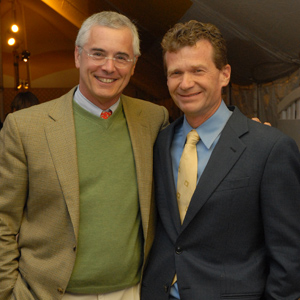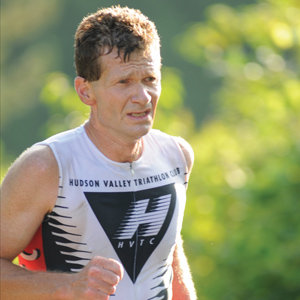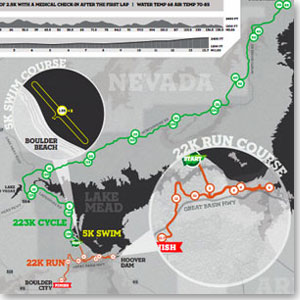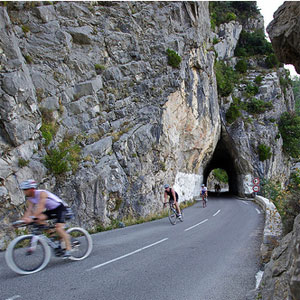HITS has horsepower

Yes, there's a new tri series. It's called HITS. Yes, these are popping up everywhere. We have TriRock, Rev3Tri, Life Time, Leadman, the Challenge Series, TriStar, and 5150. None of these series were around 5 years ago, and, more are coming.
This, is in addition to the 70.3 series, which all accrue to the new local series' popping up in your region, along with the typical races traditionally on your personal race calendar.
Should you pay special attention to this new national series of races, when there are a lot more options now for those who want to compete in a triathlon?
I interviewed the man behind HITS. He's one of a new crop of triathlon race producers who've come from another sport and who've successfully made the jump and produced big-time triathlons. Those coming to mind are John Korff and Richard Adler, primarily tennis tournament promoters who built, own and produce the Nautica New York City and Philadelphia Insurance Triathlons respectively.
The HITS Triathlon Series is the brainchild of Tom Struzzieri. He founded and still runs what is, for lack of a better analogy—and I hope Tom doesn't mind the analogy—the "Ironman" of equestrian shows, also called HITS. You might wonder what's behind the acronym. It's "Horses In The Sun."
I write this intro because a lot of Slowtwitchers wonder how a new race series can hope and expect to offer events in the class, and of the scope and scale, of a race like an Ironman, or a New York City Triathlon, or a Wildflower or Alcatraz or Malibu triathlon. If you research the HITS Horse Shows In The Sun, you'll see that Struzzieri knows how to put on a show. And—like Ironman and Competitor Group—there's private equity investment in the picture. The image above is of Struzzieri and John Danhakl from Leonard Green & Partners, L.P.
Struzzieri is a triathlete himself. He's avid. He's one of us. But, he's not an old-timer. So, one assumes there'll be plenty for him and his team to learn, and there will also be plenty new he'll bring to the sport that us old-timers would never have thought of.
Dave Scott is the latest addition to the HITS team; he's been brought along to advise a management team that, as of this writing, does not feature a masthead of marquis names in the race direction business.
SLOWTWITCH: Tom, you and I are in the same age group, which means that I think we probably share some of the same sensations, such as, feeling alternately 20 years older or younger than our actual mid-50s ages, depending on the day and the task at hand. Were I to contemplate starting a new, bold, nationwide venture such as the HITS triathlon series, that would certainly cause me to feel 75 years old. I can't imagine the size of that lift. Yet, you're doing it. What possessed you?
TOM STRUZZIERI: I have a real love for managing events. I get a kick out of the organization and the promotion. The anticipation of the customer—athlete—response is the juice that keeps me going. I have been executing my event strategy for over 30 years in events other than triathlons and felt that this is the perfect avenue to channel my energy. I have accomplished much with equestrian events including holding the largest events with the most prize money and I wanted to broaden that scope. I especially appreciate that events are unique, non-stop work and then it is over and you get a breather and start again. I am not sure I have the mentality to do the same thing day after day.
SLOWTWITCH: Answer this from either a personal or a professional viewpoint: Are there similarities between equestrian events such as those you've successfully produced, and triathlon events such as those you compete in, and that you will produce? Is there some symmetry among equestrian and triathlon enthusiasts that exists in the human psyche?
TOM STRUZZIERI: The similarities between equestrian athletes and triathletes are huge. Both sports are lifetime activities and require the athlete to devote an extraordinary amount of time into training and competing. Both sets of customers—remember they are all customers to me—demand a product that meets their needs specifically. They are paying a great deal of money and rightly want to be treated special. I think that, despite the great size of my event business, HITS has learned to specialize in being very user friendly where no customer, no matter how important they may be treated elsewhere, is treated differently. We do and will endeavor to treat each customer as if he or she is the most important.

SLOWTWITCH: You weren't shy when figuring your entry fees. Everything up to the half-distance is inside the typical entry fee scale for a top caliber race. The $600 entry for the full distance, however, is a bold number. Certainly you're used to putting on a grand show, but, is that show scalable and transferable to triathlon? Talk to us about the full distance fee structure and the value you intend to deliver in consideration of it.
TOM STRUZZIERI: The full distance race is going to require a great deal of effort to produce an international level event. We plan on incorporating the highest level of technology along with the best level of service. Seems that $600 is the very normal rate being charged for events that may not be offering the service that I will insist we provide. We all know that the market will dictate if we are priced correctly.
SLOWTWITCH: Certain race organizations, like Ironman and Life Time Fitness, are open to absorbing existing races into their series'. Others, like Rev3Tri, never seem to do that, rather they're committed to events incepted and grown from the ground up. In which camp do you place HITS?
TOM STRUZZIERI: We are committed to starting and producing all of our own events. This is the only way that we can be certain that the customer knows exactly the product to expect. With the same team—including me—travelling around the country to produce all of these events we can develop a consistency that is presently not available. We use this same strategy in the horse event business and now we set the industry standard for the best event team and product.
SLOWTWITCH: When I look at the series line-up, certain local race organizations come to mind. For example, I can't imagine a multisport event taking place in Palm Springs without Greg Klein having some involvement, especially since he situates a triathlon of his own in Lake Cahuilla in March. Yet, a Graham Fraser or a Bill Burke have shown they can swoop in, take over a venue, produce a fine race, and swoop out without using much of the local talent. Can you sketch out your event philosophy as regards centralized versus decentralized race production?
TOM STRUZZIERI: We are beginning to reach out to the local triathlon community in each venue. While we do not anticipate much local involvement on the professional level we want to create partnerships that enable us to learn as much as we can from the local experts and find ways to involve them that will satisfy both our needs. Some other prominent companies are really extraordinary merchandisers who also happen to manage events.
SLOWTWITCH: I note that certain of your triathlon race venues sit on or close to where you've had big success as a horse show producer: Ocala, Florida, Hunter Mountain, New York, Palm Springs. Can you describe the dynamic there? Are these operational decisions? As in, you approach the city fathers and say, "You're aware of the incremental income I bring to your communities, will you take a flyer with me on another venture?"
TOM STRUZZIERI: HITS has been extremely successful in certain locations throughout the country. We have spent millions of dollars on facilities in many of these areas and have a pool of full-time employees to draw upon. We have also invested in other products in these communities such as hotels and restaurants. This combined with our great experiences with the local authorities is helping us put together some very cool races. We are able to use our track record to benefit the triathlete. The Palm Springs event will highlight this asset the most. The three longer distance races will finish at our $20 Million property there in the desert and will offer amenities for athletes and spectators alike that will be very unique to the sport. That is the big reason why we choose that site for our 2012 Championship.
SLOWTWITCH: In that same vein, I note that you're launching this series in partnership with venture capital, and Leonard Green is a partner in your horse show series as well. Is this a management pattern of yours, where you leverage successful past relationships toward future ventures?
TOM STRUZZIERI: Difficult not to partner with Leonard Green when I get the opportunity. They are spectacular supporters of all that I do and their resources are extraordinary. They are unique in the private equity field, as they have a strong history of pursuing sports-based companies. Sports Authority is the perfect example of this trend.
SLOWTWITCH: Finally, Tom, how much of this series was a cold business calculation, and how much is a fulfillment of a passion? And, does it matter? What I mean is, does passion plus professionalism plus resources equal your probable success, regardless of whether a triathlon series is the sort of business you'd have chosen absent a personal passion for it?
TOM STRUZZIERI: I have a strong passion for everything that I get involved with whether business, family, recreation or community involvement. Because I have Leonard Green as a partner we can be assured of two things: we will be well funded and I will not quit on this project until it meets all of my very high expectations.
Read more here about the HITS Triathlon Series.




Start the discussion at slowtwitch.northend.network